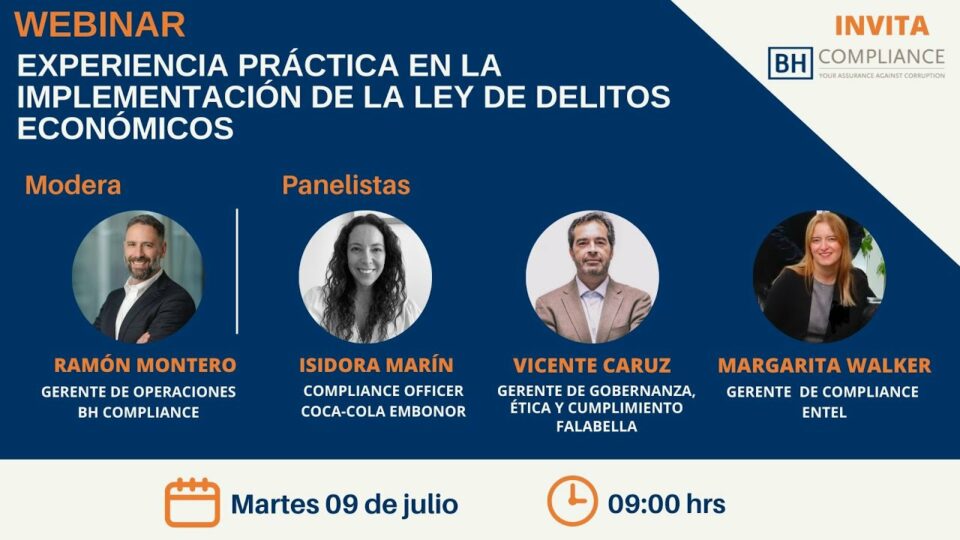
Before a large number of virtual attendees, BH Compliance held this July 9, the webinar “Practical experience in the implementation of the Economic Crimes Law”, in order to guide companies and their compliance areas to prepare for the upcoming entry into force of the law in September.
The panel was composed of Isidora Marín, Compliance Officer of 𝐂𝐨𝐜𝐚- 𝐂𝐨𝐥𝐚 𝐄𝐦𝐛𝐨𝐧𝐨𝐫; Margarita Walker, Compliance Manager of 𝐄𝐧𝐭𝐞𝐥, and Vicente Caruz, Governance, Ethics and Compliance Manager of 𝐅𝐚𝐥𝐚𝐛𝐞𝐥𝐥𝐚. The Operations Manager of 𝐁𝐇 𝐂𝐨𝐦𝐩𝐥𝐢𝐚𝐧𝐜𝐞, Ramón Montero, served as moderator.
At the beginning, Ramón Montero referred to how the new regulations strengthen compliance programs, which has companies working on updating them to address all the corresponding risks according to the line of business and the industry to which they belong. He also stressed the importance of the periodic evaluation of these programs by independent third parties.
In her presentation, Isidora Marín spoke about the work being done by Coca Cola-Embonor to address the new requirements, highlighting the real value of compliance, since beyond being a way of gathering evidence to defend against a possible lawsuit, the real objective should be to protect customers, suppliers, investors and, especially, workers. He also indicated that “a good compliance program must not only be useful in times of crisis, but must also be a constant guide to ensure that daily practices are aligned with the policies and values of a company”. He also stressed the importance of knowing the business, of compliance officers meeting with different teams and listening not only to senior management, but also to those in the operation.
Regarding how to deal with the crimes they must consider, Marín explained the pillars through which they are managing them: risk assessment, standards, policies, procedures and controls; training and communication, and monitoring of effectiveness.
Finally, Vicente Caruz referred to the changes brought by the new law regarding the criminal liability of the legal person, and then explained how Falabella is addressing these changes. Thus, he pointed out some of the considerations that companies must take into account, such as the importance of identifying activities or processes that imply risk of criminal conduct; establishing protocols and procedures to prevent and detect these behaviors; implementing a complaints channel, as well as internal sanctions in case of non-compliance; designating one or more subjects responsible for the application of protocols, and contemplating periodic evaluations by independent third parties.
On the other hand, among the challenges of implementing its Crime Prevention Models, Caruz highlighted the active review of internal processes; working with suppliers, periodic testing of controls; specific training and communications; generating and applying indicators; giving due importance to the evidence generated by the compliance programs, and reporting the results. He also stressed the importance of the role of boards of directors in the face of this series of changes.










